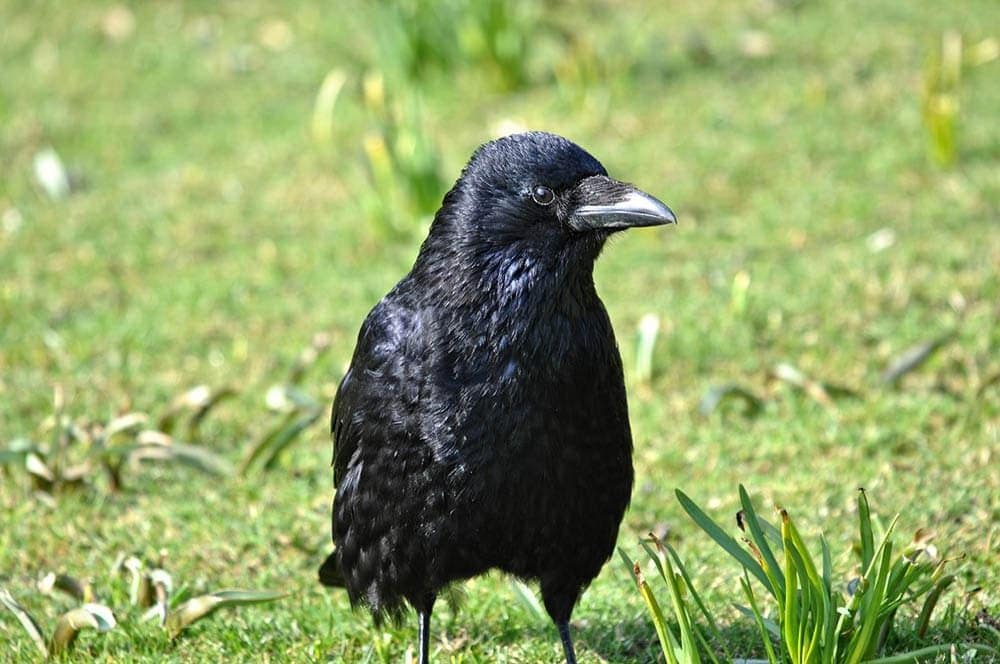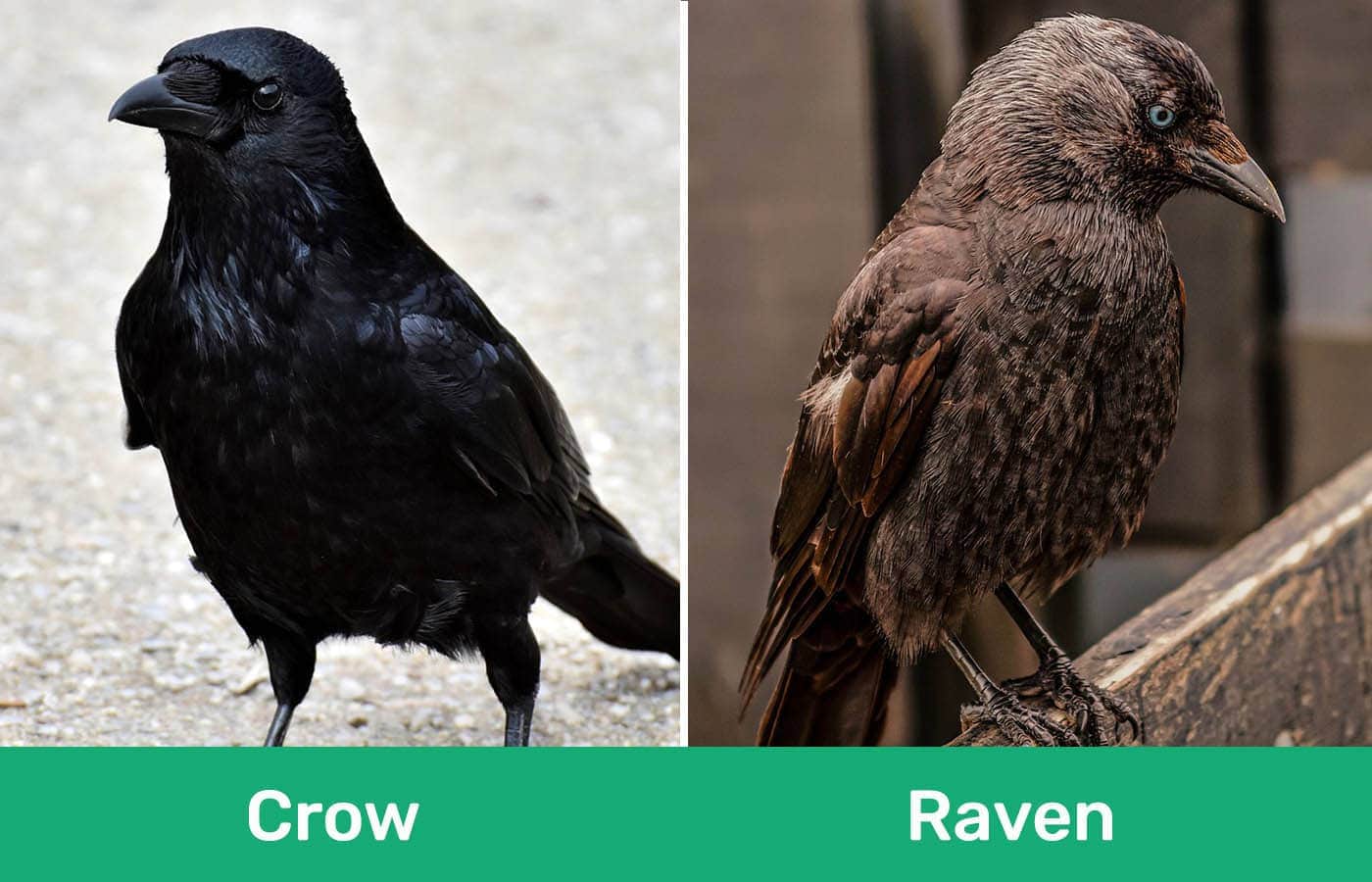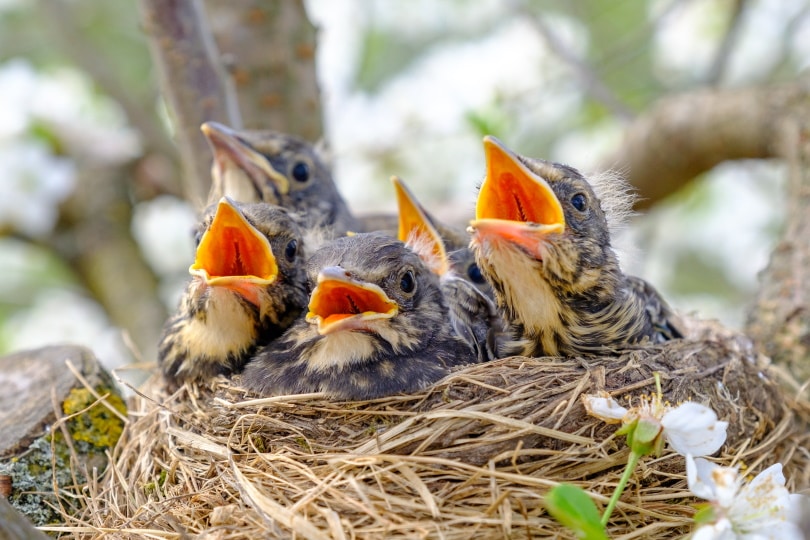Do Crows Eat Other Birds? Everything You Need to Know!
Last Updated on

Crows are birds that people see everywhere. They’re in the city, the country, and even in movies and books. A big part of human life, crows also play a huge role in many religions and cultures. Considered to be an ominous bird to many, there are quite a few things we still don’t quite understand about the crow, such as their eating habits.
Do crows eat other birds? Yes, they certainly do. In this blog, we’ll take a look at the crow, its eating habits, and even a look at the lore surrounding it as well.

Do Crows Eat Other Birds?
The answer, as previously stated, is yes. Crows are omnivorous creatures, which means they eat greens, meats, and everything in between those two food groups. The meat portion of a crow’s diet can consist of insects, small reptiles, and even small birds, especially when they’re hatchlings.
However, that doesn’t stop them from killing and eating adult birds if they so choose. Crows are one of the birds that eat both adult and young prey. Crows also eat insects, mollusk, and seeds.
Superstition, Religion, and Crows
Crows have been a source of superstition and part of many religions for ages. At one time, some cultures believed the crow to be sent to them as messengers by higher beings.
There are many superstitions associated with crows, and they’re used in many horror, as well as supernatural movies and books. For example, one belief says that spotting a crow means you’ll have guests coming soon, and seeing one is considered a good omen.
However, one superstition tells of a murder of crows singing loudly on the balcony as an omen of impending doom for your family. However, if you feed the crows, then the prophecy can change. While there are many different superstitions in different religions surrounding crows, to most of us, they’re just fascinating birds that can be a bit creepy.
What’s the Difference Between a Crow and A Raven?
For many of us, it’s hard to tell the difference between a crow and a Raven. Since they resemble one another greatly, most people just group them together and don’t think about it again.
However, there are suitable differences that help you tell the difference between them. We’ll talk about a few of those differences below.

Differences in Their Behavior
If you’re looking closely, you’ll see different behavior when a crow lands, as opposed to a Raven. Crows land in a nervous manner. This is obvious by the way they bob on the perch while fluttering their feathers.
On the other hand, Ravens land seamlessly and strong unless there’s a strong wind that shakes them and affects their balance.
Also, when fighting, a crow will divebomb the other bird and can be quite aggressive. On the other hand, A Raven flies with the other bird, leading it out instead of attacking.
- Related: Crow vs. Raven
What Birds Do Crows Eat?
Crows are omnivores, but they’re also scavengers. This means they’ll eat anything alive or dead. Small mammals such as rodents, other birds, their eggs, amphibians, and the like make up the majority of their diet.
The birds they eat depend on the size. While a crow will fight a bird that is the same size or slightly larger than it, it’s not feasible to think that they could kill and eat Owls, Hawks, Eagles, and other larger birds of prey.
Some of the ideal meal sources in the bird world for crows are the canaries, sparrows, and finches, though if they come across a larger bird that is dead or dying, they will take advantage.

Will Crows Eat Their Own Babies?
While crows will ravage and eat other birds’ eggs and hatchlings, they’re like any other parent in that regard. They don’t eat their own young. Instead, they raise their hatchlings and are good parents.
Will Crows Eat Dead Birds?
While there are quite a few ifs involved in crows eating live birds, such as the size, all bets are off if the bird in question is dead. Crows are famously known as being scavengers and will never turn down the chance to eat carrion, whether it’s a dead bird or a dead rodent.
Protecting Your Baby Birds From Crows
Now that you know that crows will eat other birds and what kind, you’re probably wondering how to protect your own baby birds from being gobbled up by a passing crow. Unfortunately, this one is a hard question to answer because whatever you choose to use to scare away the crows will scare away the birds nesting on your property as well.
Of course, you still want to know how to protect those eggs and the baby birds, so we’ll give you a few tips to follow below.
- While everyone knows that putting scarecrows in the garden or on the property will scare away the crows and protect your flowers and crops, it’ll also scare away the birds you’re trying to protect.
- To avert this, try putting up a bird net around the area with the nest in it. Make sure the small net has holes of at least 4 inches on it so that the tiny birds can get through, but the crows can’t.
- You can also try to visually scare the crows into leaving the nest alone and leaving your property as well. Do this by using shiny tins or CDs to scare them off. The scarecrow might work, but it might not be the best idea if you want the small birds to stay.
- Make sure to change the position of any equipment you use to scare crows away from the nest you’re trying to protect. Crows are smart and will realize that the equipment can’t hurt them before long, and it’ll become ineffective.

Is There Anything to Like About Crows?
While it might seem that crows are horrible creatures that just exist to prey on other animals and their young, there are actually quite a few things to like about these creatures. We’ll talk a little about that below.
Crows Are Monogamous
Crows tend to mate for life, with the only thing separating them being death. Crows are also family-oriented, which means their young stay with their parents and siblings for a few years before venturing out on their own and mating.
Crows Have Funerals
Many people have doubts that crows are highly intelligent and advanced. Those people would be mistaken and surprised to learn that crows actually have funerals. When a crow dies, the rest of the murder will come around to mourn the deceased. While it’s not as elaborate as a human funeral, they do hold them in their own way.

Conclusion
This answers our question of whether crows eat other birds and a few other things that you might have wondered about. Crows themselves tend to be a complicated species. From being tied to many superstitions, religions, and cultures to mating for life and even mourning their dead, there’s a lot about Crows we still don’t understand.
However, studies are advancing every day. Until then, make sure to keep your baby birds and eggs away from any murder of crows that might come onto your property, and you should be fine.
Featured Image Credit: Pixabay
About the Author Robert Sparks
Robert’s obsession with all things optical started early in life, when his optician father would bring home prototypes for Robert to play with. Nowadays, Robert is dedicated to helping others find the right optics for their needs. His hobbies include astronomy, astrophysics, and model building. Originally from Newark, NJ, he resides in Santa Fe, New Mexico, where the nighttime skies are filled with glittering stars.
Related Articles:
How to Clean a Refractor Telescope: Step-by-Step Guide
How to Clean a Telescope Eyepiece: Step-by-Step Guide
How to Clean a Rifle Scope: 8 Expert Tips
Monocular vs Telescope: Differences Explained (With Pictures)
What Is a Monocular Used For? 8 Common Functions
How to Clean a Telescope Mirror: 8 Expert Tips
Brightfield vs Phase Contrast Microscopy: The Differences Explained
SkyCamHD Drone Review: Pros, Cons, FAQ, & Verdict
